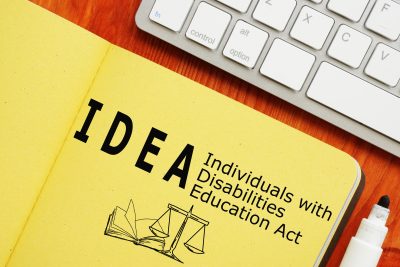A Brief Overview Full Article The Individuals with Disabilities Education Act (IDEA) is a federal law that was passed in 1990 and has been amended. The IDEA provides children with qualifying disabilities, from birth to age 21, with the right to services designed to meet their unique, individual needs. Eligible children ages 3-21 who receive Read More
Transcript of this video is below: When students with disabilities are bullied, schools are legally responsible to end the bullying. By law, schools must act to restore the safety and well-being of students who are harmed by harassment, intimidation, and bullying. Those words—harassment, intimidation, and bullying, make an acronym: HIB. This video is about HIB Read More
A Brief Overview Full Article An ill-informed conversation about special education might go something like this: This conversation includes errors in understanding about what special education is, how it is delivered, and a student’s right to be included with general education peers whenever and wherever possible. This article intends to clear up confusion. An important Read More
An advocate is someone who works toward a cause or goal. Sometimes the hardest part of advocacy is figuring out what to do next. When a child has unmet needs at school, family advocates can seek changes to a student’s services by asking for an evaluation, a meeting, a behavioral assessment, or something else. Putting Read More
A Brief Overview At school, related services help children with disabilities benefit from their special education by providing extra help and support. Options for related services are described in state law (WAC 392-172A-01155). If a child with public health insurance needs specific therapies to meet medical needs, their insurance company is obligated to support those Read More
A Brief Overview Full Article Behavior is a form of communication, and children often try to express their needs and wants more through behavior than words. When a young person has a disability or has experienced trauma or other distress, adults and authorities may need to put in extra effort to understand. Missed cues and Read More
A Brief Overview Full Article Summer provides an opportunity to reset for the school year ahead. If your child has a disability, you may want to think about what went well or what could have gone better last year. By getting organized, you can plan ahead for fall and beyond. This article includes resources and Read More
A Brief Overview Keeping track of important documents for your child’s health can save you time and give you less stress. Take advantage of technology! If you choose to build a digital storage system, integrating it with your smart phone will make it easy to share information on-the-go with doctors, day care providers, school staff, Read More
A Brief Overview Alarming statistics indicate the pandemic worsened many behavioral health outcomes for young people. Governor Jay Inslee on March 14, 2021, issued an emergency proclamation declaring children’s mental health to be in crisis. President Joe Biden issued a Fact Sheet about the nation’s mental health crisis on March 1, 2022, as part of his State Read More
A Brief Overview When a family chooses to enroll their student with disabilities in a private school, they have different rights. Those rights are summarized in this article and further explained by U.S. Department of Education guidance issued in February 2022. School districts are responsible to seek out and evaluate all students suspected of having disabilities Read More
This 2-part training has information about how to support a child’s behavior at school. When behavior gets in the way of learning, schools are responsible to figure out what the child is trying to communicate and to teach the child what to do instead. PAVE’s accessible, fillable worksheet goes with the videos to help with Read More
Why Get Help from PTI? Parent Training and Information (PTI) is federally funded to support family caregivers, youth, and professionals. We know educational systems use a lot of complicated words and follow procedures that can feel confusing. We do our best to provide tips for communicating as members of a school-and-family team that develops a student’s Read More
A Brief Overview The Adolescent Behavioral Health Care Access Act, passed into law by the Washington Legislature in 2019, gives parents and providers more leverage in treating a young person who will not or cannot independently seek medical help for a behavioral health condition. The Washington State Health Care Authority (HCA) hosts website links with information about Read More
A Brief Overview Schools are required to accommodate parents to ensure their attendance and participation at meetings where their child’s special education services are discussed. Those rights are affirmed in a court decision from 2013: Doug C. Versus Hawaii. A meeting that includes family is a higher priority than a renewal deadline. If a deadline Read More
A Brief Overview Full Article Students with disabilities who are bullied at school have legal protections, and schools have added responsibilities to ensure their safety and well-being. When acts of bullying involve discrimination based on disability, race, sex, or religion, federal agencies classify those acts as harassment. The Office for Civil Rights (OCR) and the Read More

